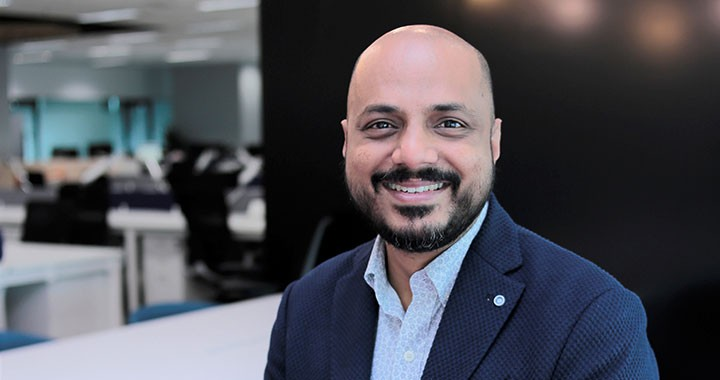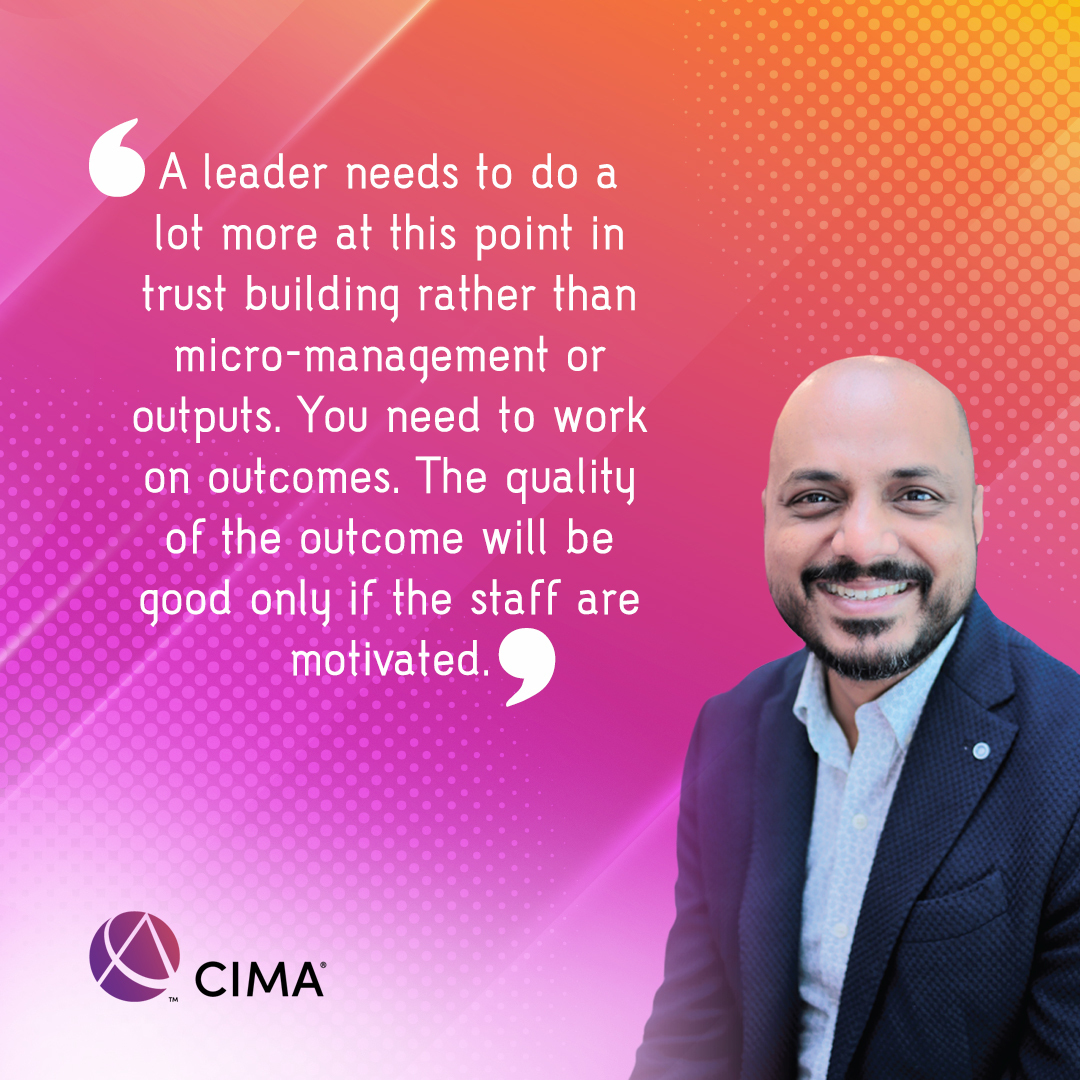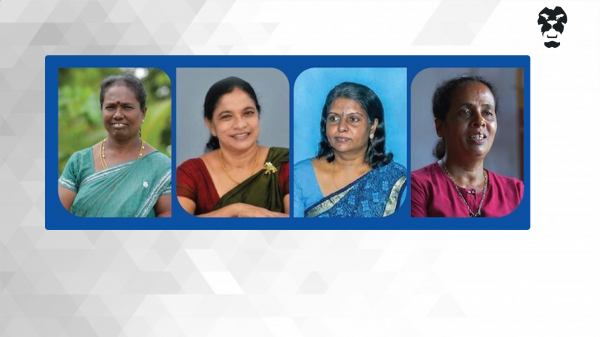
The world of finance is changing and demands that its professionals do the same. As automation affects the roles of everyone in the finance sector, from college graduates to chartered accountants, business opportunities and organizations require additional skills to add value to operations and maintain relevance. The burden of delivering these skills falls squarely on tomorrow’s financial leaders.
In November 2019, The Association of International Certified Professional Accountants (The Association), powered by the American Institute of CPAs (AICPA) and Chartered Institute of Management Accountants (CIMA), launched, worldwide, the CGMA Finance Leadership Program, an online learning program, similar in scope and rigor to a master’s degree, that teaches the business, technical, digital, people, and leadership skills needed to succeed as a finance or business professional.
We spoke to Venkkat Ramanan, FCMA, CGMA on what it takes to be a good leader in finance and CIMA’s role in building the next generation of financial leaders. Ramanan, who is based in Petaling Jaya, Selangor, Malaysia, is a distinguished CIMA alum and current Regional Vice President to the Asia Pacific of The Association.
- How has being a graduate of CIMA prepared you for a career in finance and administration?
“It’s something that I completed 20 odd years ago that is still relevant enough for me to exist and thrive.
“The biggest angle for CIMA is that it connects business with finance. It brings leadership, the ability to work with people, and knowing how important people are in getting impactful outcomes. We don’t exist in a world where we are technically sound and good but one where we have to be rounded enough to know what’s going on in the industry and our teams, how we can influence, motivate, communicate with, and get the best out of them as well as work with them and bring in leadership.
“We exist in a world where things are rapidly changing and we need to be agile. We need to know that, if something goes wrong tomorrow, there’s no rulebook. Imagine having a meeting and somebody says something has happened. One doesn’t take a rule book, look at page 52, and try to figure out what the options are. We have to be agile and determined in our approach and make decisions.
“CIMA has enabled me to apply what I know, on a very nimble outcome-driven basis, with an outlook that connects the external environment internally with people and business. It has brought me through this journey so far, kept me relevant and validated, and really changed my life in that way.”

- What does good financial leadership mean?
“Finance is at the centre of everything we do because we manage the cash for the business. If somebody wants to initiate a new business opportunity, they require funding. Whether the company has the money or goes externally, you need to be able to project confidence in terms of what you’re supposed to do.
“Very often, finance professionals are criticized for their inward thinking. They are technically sound and look at all number-driven approaches to make a decision. They don’t consider the qualitative factors. They are all very quantitative.
“When a company needs to make a decision to invest or not, they look at the finance professionals. If they (finance professionals) don’t understand that technology changes customer needs, they are going to be too uncertain to say ‘Sorry, this ROI does not make sense.’ But a finance leader will say, ‘Maybe in the short term, this may not make any sense, but this is essential now. Customers want that. I hear what they say. So, will this keep our customers within the next two to three years?’
They must be able to connect with others in the business, a salesperson for example, and ask, ‘What are you seeing as trends in the next few years? What, according to your customers, has changed?’
They can ask the Chief Information Officer, ‘How will technology shift the capability for our business to remain relevant?’
“The answers are there but finance leaders must seek them to build and communicate an impactful story that can influence the rest of the organization to remain relevant and sustainable. That’s what finance leaders are all about.”
- What are the key characteristics of a good financial leader?
“There’s something called ‘Learn, Unlearn, Relearn.’ I qualified 20 years ago. That does not mean I know everything now.
To that fact, a study from McKinsey in 2017 said that up to 375 million people may be jobless by 2030 if they do not switch occupations and learn new skills. The key capability everybody needs to have right now is to quickly unlearn things that are not relevant, learn new things, and keep one’s skills up-to-date.
“Teamwork and communication are all a given in the world we live in. Teamwork is bringing capabilities of different people to do things in such a way that they fight for the organization rather than work for themselves. These are already a given in the context of becoming a management accountant.”
- What skills should potential financial leaders learn or refine?
“In CIMA’s context, there is one critical skill that will be at the center that connects everything else together – digital skills. We noticed that technology is going to shift and change everything we do.
“Digital skills are where we see how things are going to change in the business environment, connect with the customer quickly, and learn what those changes are. We need to understand how our technology skills will influence our world in the future. We need to know what technology is shifting now and what that means to our business.
“I have people skills; but how do I use my digital skills to connect with the people? I have business skills; but how do I use digital skills to understand business better? I have customers; but how do I give a better customer experience that is seamless, efficient, and cost-effective?
“Digital skills will continue to evolve as something crucial and important. But, that does not mean that you will lose your other skills. You just connect them with your digital skills at the center.”
- How has the field of management accounting had to change to deal with this new normal?
“We call it ‘evergreen’. That means our syllabus changes as and when things change externally. It’s constant. ‘Evergreen’ is our capability to make sure our syllabus is still relevant and required by the business, not now, but in the future.
“Four years ago, the syllabus used to change once every four years. There was a cycle. Now, the syllabus can change and we can communicate that change to the students and lecturers instantaneously.
So, when the students come out as management accountants and start working, they know what the changes are.”
- Do you believe the nature of management accounting as a profession makes it an easier transition to working remotely?
“As a leader and a management accountant, the first and foremost thing to establish with your team is trust.
“People are at home working and not at the office. I do not essentially start all of my calls very early in the morning because I am respectful of my colleagues who have families and kids, and conscious of school times and work balances they may have. Everybody had a right to refuse a call if they had something else and could catch up with us later. We, as leaders, have to go out of our way to establish trust with the teams.
“You have to elevate that trust to a level where, through your communication and respect for them and the trust building process that you put out, they believe the work that they do with you and deliver.
“You don’t even need to manage it daily. There’s a big issue in terms of some leaders saying “Let me know what you did every day or every hour.” That does not work. You may not have a nine to five. You may have a ten thirty to two. You may take a break from two to five. You may start working from eight to eleven. That is completely fine.
“What’s important is the capability for them to deliver outcomes when they are needed at the quality that you need that can make an impact. So, building trust is not at the employee’s level but at the leader’s level. We have to take every effort to do that.
“And, you need to have difficult conversations when they don’t deliver. There’s no question about it. But what you also need to do is put your hat on as a mentor and coach. You must have empathy and EQ. You need to understand what environment each person is in.
“A leader needs to do a lot more at this point in trust building rather than micro-management or outputs. You need to work on outcomes. The quality of the outcome will be good only if the staff are motivated.”
- Does digitizing learning make it more accessible or does it also create challenges?
“I would say the main outcome or benefit of digitizing learning is that you are giving the end consumer control over the learning journey.
“The digitization of education gives you freedom to choose what you want because it’s not access-restricted. You do not need to travel to a specific part of the world to learn. Digitizing learning and enabling competencies in a digital world makes it far more cost-effective as well because you are not restrained by location.
“With digitizing education and learning, the customer experience matters more than anything else. You are now accessing the system which you find easy to learn and feel motivated to complete and deliver. When the CGMA Finance Leadership Programme is launched in
January, you will see the difference it will create.”
- Do you have any advice for students looking to enter the CIMA programme?
“Be fearless in the career that you choose. CIMA members touch people’s lives in different ways. We are not textbook accountants. We are business leaders who know finance; and the skills that empower us will empower business development.
“Right now, COVID-19 is attacking the economic systems of countries, saturating business beliefs, and creating a negative impact on economies. Confident and talented management accountants can keep a company sustainable as well as profit and value-driven. When businesses turn around, economies turn around, and countries grow and prosper. It is never a situation of we being inward and doing what we do. CIMA motivates and provides you with confidence so that those critical changes have a ripple effect up to the end outcome.”








